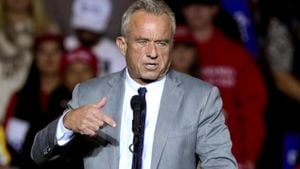Prime ministers and global leaders from across the world convened for the 29th edition of the United Nations Climate Change Conference, commonly referred to as COP29, held this year from November 11 to 22, 2024, in Baku, Azerbaijan. This year’s conference has sparked intense discussions around climate finance, particularly focusing on the urgent need for increased funding and innovative financial strategies to combat the world's climate crisis.
One of the notable voices at the conference was Pakistan's Prime Minister Shehbaz Sharif, who called for $6.8 trillion to support developing nations by 2030. Speaking at a climate finance roundtable, he emphasized the dire situations faced by developing countries, many of which are rarely equipped with adequate resources to tackle the challenges posed by environmental changes. "We need urgent climate finance to tackle issues brought by environmental changes," said Sharif, urging developed nations to fulfill their unkept promises.
Sharif highlighted the devastating toll of recent catastrophic floods in Pakistan and how these natural disasters exemplify the pressing need for global cooperation and funding. The prime minister pointedly stated, "Developing countries require $6.8 trillion to manage the impacts of climate change effectively," alluding to the growing impacts of climate change worldwide.
Meanwhile, the High Ambition Coalition, representing both developed and developing nations, asserted the necessity for trillions of dollars to implement climate action effectively. Key players like Canada, France, Germany, and the Netherlands acknowledged the urgency for financial support as outdated commitments linger without fulfillment. The coalition stressed the importance of adapting international finance systems alongside ensuring grant-based and concessional financial support, intensifying the call for the wealthier nations to step up.
Harjeet Singh, the global engagement director for the Fossil Fuel Non-Proliferation Treaty Initiative, commented on the discussions, stating, "This is not just investment; it's an obligation. Developed nations must uphold their historical responsibility and meet these real needs on the ground." The coalition’s report called for swift processes to approve and disburse climate funds—a necessity as the environment grows more perilous.
The discussions took on urgency as challenges arose during the negotiation process itself. After disagreements over the agenda led to significant delays, tensions built among nations as developing countries, including representatives from the G77 and China, voiced their rejection of existing frameworks proposed by wealthier nations. Thirsty for public funding, they demanded substantive agreements addressing mitigation, adaptation, and loss and damage.
While some nations pushed for broad, multifaceted financial strategies blending private and public contributions, concerns remained over relying too heavily on loans versus grants, especially as developing nations grapple with substantial debts from previous financial arrangements. Critics asserted, as Sharif highlighted, "Debt cannot become the acceptable new normal in climate financing; we must prioritize non-debt financing solutions enabling countries to fund climate initiatives effectively."
This year’s conference also brought Africa’s needs to the forefront. Musalia Mudavadi, Kenya's Prime Cabinet Secretary, announced commitments amounting to Ksh167 trillion (approximately $1.3 trillion) for climate action across African nations. He challenged world leaders to mobilize urgent climate finance to address the myriad of climate challenges facing the continent, which contributes minimally to global emissions yet is disproportionately affected by climate-related disasters.
African nations continue to challenge the inconsistency of global funding commitments aimed at alleviating their climate-related struggles. Mudavadi expressed determination, noting, "It is now more important than ever to transform words of commitment—like the longstanding promise of $100 billion annually—into concrete actions for climate finance." The Kenyan leader's plea underscored the glaring financial gap for climate adaptation on the continent.
UN Secretary-General António Guterres echoed the sentiments of many leaders at the summit, underscoring the imperative for action by wealthier countries. Guterres stated “this requires significant increases in concessional public finance, along with innovative funding solutions to mobilize far greater sums," emphasizing the role of developed nations to deliver on their promises. His address resounded with urgency, defining this moment as not only pivotal for current negotiations but also for future generations.
COP29 also seeks to mature the conversation around carbon taxes—a topic generating buzzing debate. Carbon taxes are viewed as one of the most effective tools for reducing emissions but face challenges, particularly concerning their fairness and potential economic impacts. Advocates argue they are necessary to encourage industries to minimize their carbon footprints, holding wealthier nations to account for their higher historical emissions.
Challenges faced by developing nations, which contribute significantly less to global emissions and climate change, only add layers to the issue. Many highlight the need for more transparent and accountable frameworks for financial commitments to prevent misallocation of resources and to guarantee funds are deployed effectively to where they are needed most.
With only days remaining until the new collective quantified goal (NCQG) is finalized, the spotlight remains on negotiators to prioritize outcomes favoring developing nations’ needs. Experts highlight the dire reality: funding isn’t just about climate justice—it’s about survival for many communities worldwide.
The stakes have never been higher. The outcomes of COP29 will set the financial foundation for climate action efforts and determine how seriously the international community will confront the global climate crisis. Will the pledges echo through the halls of history as mere promises or as the concrete steps taken to save the planet? Only time will tell as nations continue to negotiate, navigate their interests, and grapple with the moral imperatives laid before them.
With numerous deals potentially on the table and momentum building, the world's eyes are focused on Baku. Climate change is not merely the responsibility of those who have traditionally contributed to it; it's everyone's problem. And as such, everyone must participate to find viable solutions. If COP29 proves successful, it could signal the beginning of a transformative era where climate finance becomes centered, equitable, and accessible to all nations, not just the privileged few. Yet the reality of the negotiations and how they play out on the global stage will be the true test of leadership and global solidarity against climate adversity.



